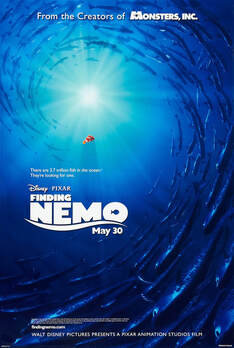
https://www.pluggedin.com/movie-reviews/findingnemo/
Recently, I made the mistake of debating with my girlfriend, Emily, as to what makes a top-tier, Disney Pixar film. My criteria are simple: It must bring me to tears, teach me something about the human experience, further the limits of animation and bring me joy. (The Incredibles, Inside Out & Toy Story all meet these criteria.) Naively, I thought she would agree with my picks, but after looking at my listed Pixar rankings (https://boxd.it/xKVa) however, it turned out that we both differ on a few of our respective choices (Wall-E should be top 3 territory, apparently). Is it enough of an issue to classify it as a ‘dealbreaker’? Of course not, as there is grace for all who truly repent, after all! Thankfully, though, I was eventually able to move past our little disagreement, following the discovery of our mutual love and appreciation for Finding Nemo. It meets our own personal criteria, and features (for both of us) one of the most delightfully simple Gospel links in recent cinematic memory…
In essence, Finding Nemo is another of Pixar’s journeys into uncharted cinematic territory - or in this case, uncharted cinematic waters. Never have we seen the Great Barrier Reef look quite as beautifully realised as it does in Finding Nemo – a widespread cinematic canvas, bursting forth with colour and teaming with life. And although animated, Nemo is a tale that’s authentic to marine life – both in terms of fish biology and behaviour. Not only do we see the beauty of ocean life, however, but we also see the horrors: a barracuda attacks and almost wipes out an entire family of clownfish, and later, divers (unknowingly) separate the remaining two from one another – the overprotective and neurotic Marlin (Albert Brooks) and his spirited, but headstrong son, Nemo. Determined to bring him safely home, Marlin abandons the security and comforts of life on the reef, and heads into the dangerous unknown of the ocean to save him.
Perhaps the most pertinent biblical parallel one could make in reference to Finding Nemo is the Parable of the Lost Son. Comparisons abound particularly early in the film, when we witness Nemo dishonour his father just as the son did in Luke 15:11-32, by ignoring instructions from his father, informing him that “I hate you”, and recklessly touching the hull of a boat. Soon enough, Nemo’s actions lead to him being whisked away to a far-off place (Luke 15:13) by a team of divers, who take him further away than he ever wanted to go. The comparisons to Luke 15 continue when we see Marlin actively search for Nemo – encountering a whole host of colourful characters along the way. For just as the father in Luke 15 was searching for his son, despite him being “still a long way off” (V20), Marlin does the same and determinedly scours the ocean for him. The pair are later reunited in an overwhelmingly joyous moment of love between the two (just as in the parable from Luke), but it’s an earlier moment from within the film which demonstrates even more powerfully what it meant for Marlin to arrive at that point. And this is achieved through the power of story.
Taking place at Nemo’s lowest point, when he believed that he’d never see his father again, we watch and listen as the young clownfish is told by a pelican of how his father has been searching for him across the ocean, stopping at nothing to get his son back. Like all great stories, it’s one that has travelled a great distance and spread to countless characters who are subsequently touched by Marlin’s great love for his child. But nobody reacts quite like Nemo – he’s overjoyed, but in shock that his father would risk everything for him. At first, he doesn’t even believe that the story is referencing his own father! But he soon comes to realise that it’s true. Marlin has indeed been searching for Nemo and is calling him home.
Do you remember when you first heard the Good News for yourself? Did you react with disbelief like Nemo, not trusting that your heavenly Father was able to or wanted to save you from the effects of your sin? Or did you believe it immediately, accepting it for the truth that it is? Regardless of how you initially reacted, we cannot deny that there is distinct power in the Good News of Jesus - for through it we learn that the Father is searching for and is beckoning us home to Him. But in Nemo’s case, we see that such good news prompted him to be uplifted from his sorrow and spurred him on to return to his father as soon as he could. And the Good News of Jesus works similarly for those who believe and trust in it. As the hymnist John Newton once observed, the Good News and the name of Jesus is “sweet” to those who believe it – for it “soothes our sorrows” and “heals our wounds”. Those who trust in it to be saved will be so – for they “know it is the very power of God” (1 Corinthians 1:18, NLT) itself.
Perhaps many like the lost son or Nemo, long to come back home, but feel that there is no way home. Thankfully, there is with Jesus. For we read that God – like Marlin – fought through everything in His path to save humanity. He destroyed the power that sin has over us, by sending Jesus to take our place on the cross and pay the penalty for our mistakes. He “personally carried our sins in his body on the cross so that we can be dead to sin and live for what is right” (1 Peter 2:24, NLT) He made a way where there wasn’t previously a way, to return home to the Father’s house. But will you now tell of His wondrous story across our lands, speaking of how the Father fought for us to be made safe, so many would be caught up (like Nemo) in the wonder of the cross?



 RSS Feed
RSS Feed